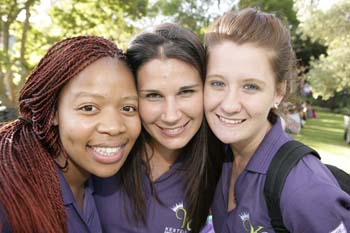
Three first-year students from the Kestell residence that attended the first-year welcoming.
Photos: Johan Roux |
Few life experiences are as exciting as becoming part of a university. On Friday 16 January 2015, Kovsies embraced our first-year students into our family after great anticipation.
That evening, first-years and their parents streamed to the Red Square on our Bloemfontein Campus where they were formally welcomed. This event also served to kick off the 2015 Gateway Programme – an orientation programme for all our first-years.
Dr Choice Makhetha, Vice-Rector: External Relations, addressed the first-years and congratulated them on their excellent matric results.
“The fact that you are here is a testimony to the level you are able to work at,” Dr Makhetha said.“You will have fun and make friends at the UFS. Your friends will be from different backgrounds and speak different languages than you. Embrace it all. You are now a part of the UFS family.
President of the Student Representative Council (SRC), Mosa Leteane, also reassured first-years that they are where they belong – at a university that inspires excellence.“This is the only space where the university’s international relations give opportunity to first-years to travel abroad with our F1 Leadership for Change Programme,” Leteane said. “It is the only space where the rector openly talks to his students, without having an appointment. It is the only space in our country where no student goes hungry due to our No Student Hungry (NSH) Programme.”
The following evening provided a spectacular live show with well-known artists Karen Zoid and Vusi Mahlasela entertaining the crowd. They performed alongside the Free State Symphony Orchestra (FSSO) that added even more dazzle to this Gateway/NSH first-years concert.
On Saturday 17 January, the new-comers had an opportunity to visit their respective faculties and get to know the staff and facilities a bit better.